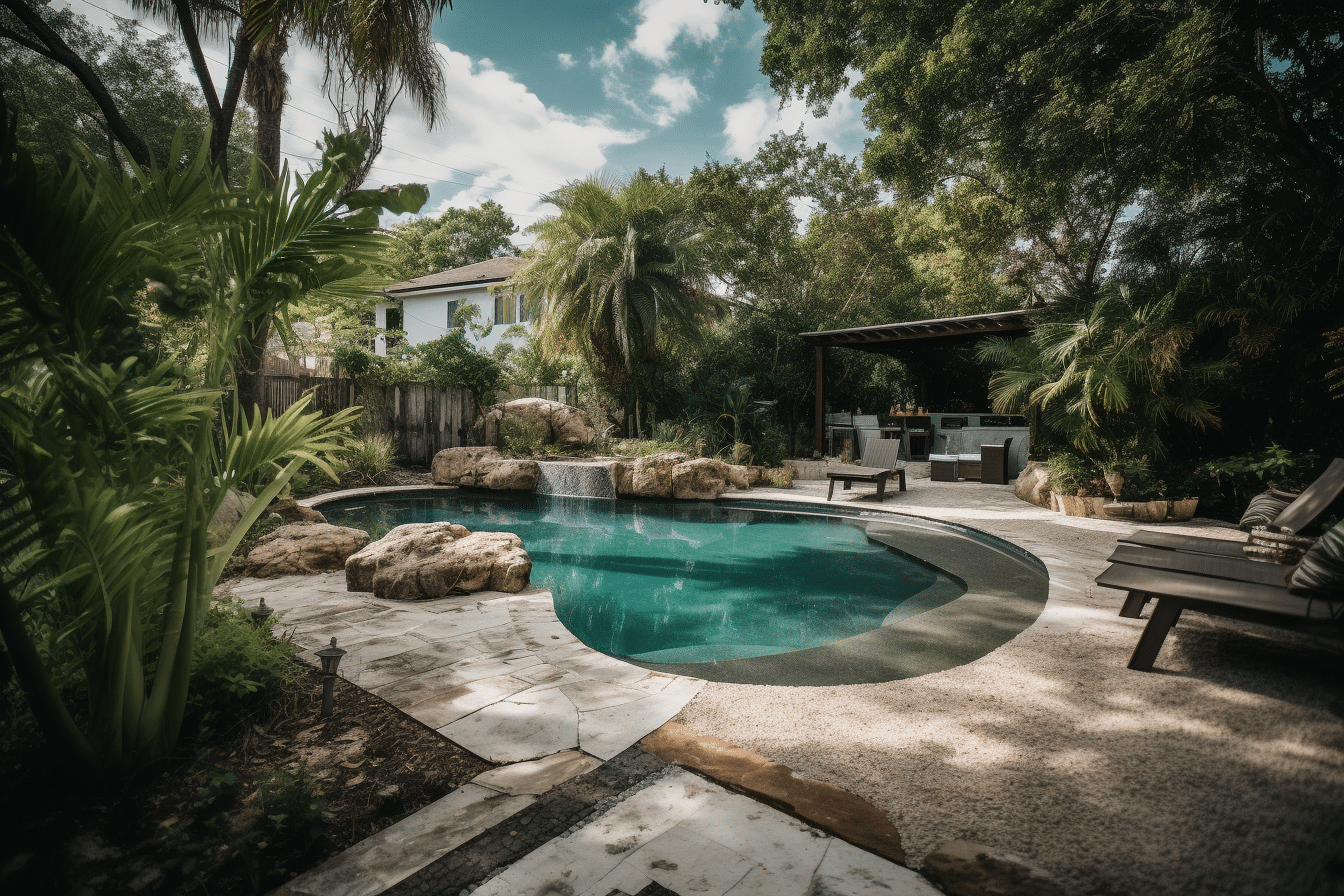Swimming pools, long considered a symbol of luxury and leisure, are more than mere recreational amenities. In recent years, the demand for residential swimming pool installations has surged due to their numerous advantages in health, socialization, and property value enhancement.
As homeowners increasingly seek opportunities to create outdoor living spaces that promote relaxation and wellness, understanding the benefits of adding a pool to one’s home becomes indispensable. In this article, several compelling reasons will be explored as to why investing in a backyard oasis is not only an aesthetically pleasing choice but also a practical decision backed by science and market trends.
Drawing from expert insights into pool design, installation best practices, and empirical research on aquatic therapy and exercise benefits, readers will learn how owning a pool can enrich various aspects of life while fostering a sense of belonging within family units and communities.
Health Advantages Of Swimming
According to a study by the National Swimming Pool Foundation, swimming can burn between 500-600 calories per hour, making it an effective form of exercise for weight management and overall health.
Swimming therapy in one’s daily routine offers numerous cardiovascular benefits, such as improved heart function and increased blood circulation.
In addition to these physiological advantages, engaging in regular aquatic activities positively affects mental well-being.
Swimming pools provide an outlet for physical exertion and serve as therapeutic environments conducive to relaxation and stress relief.
As a pool design and installation expert, creating spaces that facilitate physical activity and mental rejuvenation is crucial.
Employing soothing water features, comfortable seating areas, or even incorporating hydrotherapy jets within the pool enhances the user experience while promoting better health outcomes.
Integrating a swimming pool within the home environment fosters opportunities for enhancing social interactions and family time.
With ample space for guests and loved ones to gather and enjoy various activities, homeowners can create lasting memories with those who matter most.
Moreover, this shared interest in aquatic leisure promotes a sense of belonging among individuals from diverse backgrounds – transcending age groups, cultures, or socio-economic statuses – further enriching their lives through camaraderie built upon common ground.
This seamless blend of health benefits and strengthened social bonds paves the way for subsequent discussions surrounding other potential advantages of having a residential pool.
Enhancing Social Interactions And Family Time
While the health benefits of swimming are indeed significant, another advantage that a pool brings to one’s home is its capacity to enhance social interactions and family time. Poolside gatherings are ideal for strengthening connections with friends and loved ones in a relaxed outdoor setting.
- Hosting parties: A private pool is an excellent venue for hosting various events such as birthday celebrations, barbeques, or casual get-togethers. It allows guests to unwind, converse, and enjoy fun aquatic activities.
- Family bonding: Spending quality time together near or within the pool can improve family relationships by promoting communication and collaboration among members while participating in enjoyable water games or relaxing under the sun.
- Encouraging physical activity: As mentioned earlier, swimming boasts numerous health advantages; thus, having access to a pool at home may enable individuals – especially children – to be more physically active instead of engaging excessively in sedentary pastimes like watching television or playing video games.
- Expanding social networks: Inviting neighbors for regular poolside gatherings fosters camaraderie and allows homeowners to build new connections within their community.
The impact of these enhanced social experiences extends beyond mere entertainment value; they contribute significantly towards emotional well-being, mental health, and overall life satisfaction. Pools have the potential to transform homes into hubs for leisurely recreation where meaningful bonds can flourish among people from different walks of life.
As demonstrated throughout this section, pools offer more than just aesthetic appeal—they serve as catalysts for forging deeper interpersonal ties, ultimately enriching our lives on multiple levels.
The next aspect worth considering when contemplating adding a pool would be how it might boost property value and appeal—further solidifying the case for incorporating this feature into one’s residence.
Boosting Property Value And Appeal By Adding A Pool
The story of the Phoenix rising from its ashes to attain new life underscores the transformative power a well-designed pool can have on a home’s property value and appeal.
In much the same way, homeowners who invest in adding a swimming pool can witness their humble abode transform into an enviable oasis, resulting in increased interest among potential buyers and renters alike.
This metamorphosis elevates one’s living experience and solidifies the homeowner’s position as a savvy property investor.
A significant aspect of this transformation is the enhancement of curb appeal. A beautifully designed pool area draws attention and admiration from passersby while simultaneously increasing the overall aesthetic allure of the property.
An expertly crafted poolscape fosters feelings of belonging for visitors, effortlessly enticing them to visualize themselves relaxing by the water or enjoying leisurely laps under sunny skies.
Homeowners create an inviting atmosphere that blends harmoniously with indoor and outdoor spaces by integrating captivating features such as fountains, attractive decking materials, and lush landscaping elements.
The investment in a pool offers more than just recreational benefits; it serves as evidence of careful consideration towards optimizing space utilization and capitalizing on opportunities for future appreciation.
As prospective buyers walk through properties searching for their next dream home, they will undoubtedly be drawn to those offering shelter and respite from daily stressors. In this personalized sanctuary, lasting memories are created amid tranquil surroundings.
The addition of a pool demonstrates foresight in cultivating an environment primed for relaxation, recreation, and rejuvenation – qualities that hold immense sway over informed purchasing decisions.
In these carefully curated spaces, homeowners prepare to plunge into creating their personalized outdoor oasis – diving headfirst into uncharted waters teeming with limitless possibilities.
Creating A Personalized Outdoor Oasis
Enhancing property value and appeal are significant benefits of adding a pool to one’s home. However, the advantages continue beyond there. Homeowners can create their personalized outdoor oasis that caters to individual preferences and enlivens everyday experiences.
A well-designed backyard swimming pool can be transformed into an idyllic retreat through customized landscaping and unique water features. Proper planning allows homeowners to shape their pool area according to specific desires: a tropical paradise or a serene zen garden.
Landscape designers specialize in incorporating lush greenery, vibrant blooms, architectural elements such as pergolas and gazebos, lighting arrangements, and various seating options for relaxation and socializing purposes. Moreover, innovative water features like fountains, cascades, waterfalls, or spas serve as focal points of aquatic sanctuaries while inducing soothing sounds that promote serenity.
In addition to aesthetic pleasure derived from designing bespoke outdoor spaces tailored to personal tastes, another vital aspect of installing pools is environmental considerations and energy efficiency.
Environmental Considerations And Energy Efficiency
Adopting environmentally friendly practices and energy-efficient systems in pool design is becoming increasingly important. Homeowners who are conscious about their ecological footprint can benefit from incorporating sustainable materials into their pool construction and implementing renewable sources for heating and energy supply. Utilizing solar power to heat the water drastically reduces greenhouse gas emissions and significantly lowers operational costs.
- Sustainable Materials: Opting for eco-friendly materials such as recycled glass tiles or reclaimed wood decks can contribute to a greener living space while maintaining an aesthetically appealing environment.
- Solar Heating: Investing in solar heaters allows homeowners to harness clean, renewable energy that efficiently heats the pool without relying on traditional fossil fuel-based methods.
- Energy-Efficient Pumps & Filtration Systems: Modern pumps and filtration systems offer enhanced performance with reduced power consumption, ensuring cost savings and environmental benefits.
Selecting appropriate plants and landscaping around the pool area further enhances its sustainability by providing natural shading, reducing evaporation rates, and promoting biodiversity.
Moreover, integrating advanced technology like automated covers helps maintain optimal water temperature levels while minimizing chemical usage – contributing to a healthier swimming experience for users.
As demonstrated above, thoughtful planning of pool design encompasses more than aesthetics; it plays a vital role in creating a comfortable yet environmentally responsible space that fulfills the homeowner’s desire for belonging within a community dedicated to preserving our planet’s resources. Considering these crucial aspects during the design process ensures a lasting positive impact on personal enjoyment and global conservation efforts.
Frequently Asked Questions
What Are The Ongoing Maintenance Costs And Requirements For Owning A Pool?
Ongoing maintenance costs and requirements for owning a pool encompass various aspects, such as using pool chemicals and efficient filtration systems.
Pool chemicals are essential to maintaining optimal water quality, ensuring that harmful bacteria and algae do not increase in the aquatic environment; this involves routine testing of pH levels and balancing agents like chlorine or bromine.
Filtration systems play a vital role in circulating water, removing debris, and preventing stagnation. These components require regular upkeep – including filter cleaning or replacement – contributing to overall maintenance expenses.
It is important to note that investing time and resources into proper care supports the longevity of a swimming pool while also fostering an inviting atmosphere where individuals can gather, socialize, and establish lasting connections within their community.
How Does The Addition Of A Pool Impact Homeowner’s Insurance Premiums?
Adding a pool to one’s home can be refreshing and transformative, like diving into calm waters on a hot summer day. However, it is essential to consider how this new feature may cause rising premiums in homeowner’s insurance policies due to increased liability risks associated with pools.
Coverage limitations also come into play as standard homeowner’s insurance plans may not fully cover certain types of damages or accidents related to swimming pools. Typical homeowner’s insurance plans may not fully cover certain types of injuries or accidents related to swimming pools. Drawing from extensive experience in pool design and installation, it becomes crucial for homeowners to consult their insurance providers before embarking upon such an endeavor, ensuring that they obtain adequate coverage while simultaneously fostering a sense of belonging within communities where recreational amenities are highly valued.
What Safety Measures And Precautions Should Be Taken To Prevent Accidents Around The Pool Area?
To prevent accidents around the pool area, it is essential to implement specific safety measures and precautions.
Pool fencing is crucial in providing a secure barrier restricting unauthorized access, particularly for young children at risk of drowning.
Installing slip-resistant surfaces surrounding the pool can significantly reduce the likelihood of slips and falls by offering enhanced traction when wet.
These features contribute to establishing an environment conducive to relaxation and enjoyment and foster a sense of belonging among individuals seeking shared experiences within safe and well-maintained spaces.
By adhering to these recommendations, homeowners can effectively minimize potential hazards and create a more secure swimming environment for all users.
How Much Time And Effort Is Typically Needed For Pool Upkeep, And Can It Be Easily Managed By Homeowners Or Require Professional Assistance?
Imagine the tranquil sight of crystal-clear water shimmering under the warm sun, surrounded by a beautifully designed pool area that invites relaxation and leisure.
Pool upkeep, while essential to maintaining this inviting atmosphere, can be a manageable task for homeowners. With advances in technology, such as pool automation systems, it is now easier than ever to manage your pool’s maintenance efficiently and effectively. These innovative solutions allow you to monitor and control various aspects of your swimming pool environment, including filtration schedules, heating elements, and chemical balancing – all from the convenience of a smartphone or tablet. Moreover, efficient cleaning methods like robotic cleaners can help reduce the time spent on manual labor.
While professional assistance may still be required for specific tasks like seasonally opening and closing the pool or addressing complex equipment malfunctions, homeowners can often easily manage routine care. By embracing modern tools and techniques, one can effortlessly uphold their backyard oasis’s pristine condition while fostering a sense of pride and belonging within their personal retreat space.
Are There Any Legal Or Permit Requirements To Consider Before Installing A Pool In My Property?
Before installing a swimming pool, homeowners must be aware of and address Legal Considerations and Permit Necessities that may pertain to their property.
Regulations regarding pools can vary greatly depending on local jurisdiction; therefore, consulting with relevant authorities or engaging professional assistance is best to ensure compliance with building codes, zoning regulations, and safety standards.
Acquiring necessary permits safeguards against potential legal ramifications and fosters a sense of community responsibility by adhering to established guidelines designed to protect individual property owners and the broader neighborhood.
Conclusion
In conclusion, deciding to add a pool to one’s property is multifaceted and necessitates careful consideration of various factors. These include ongoing maintenance costs, potential impact on insurance premiums, safety measures, time and effort for upkeep, and legal and permit requirements.
It is crucial for homeowners to extensively research and weigh these aspects before making an informed decision.
Future research in this domain could explore more innovative ways to minimize maintenance efforts while maximizing safety precautions around pool areas. This would enhance the appeal of installing pools and contribute positively to the overall experience of owning a pool at home.
The key lies in striking a balance between enjoyment from having a private swimming oasis and ensuring that it remains a safe, manageable addition to one’s property.







